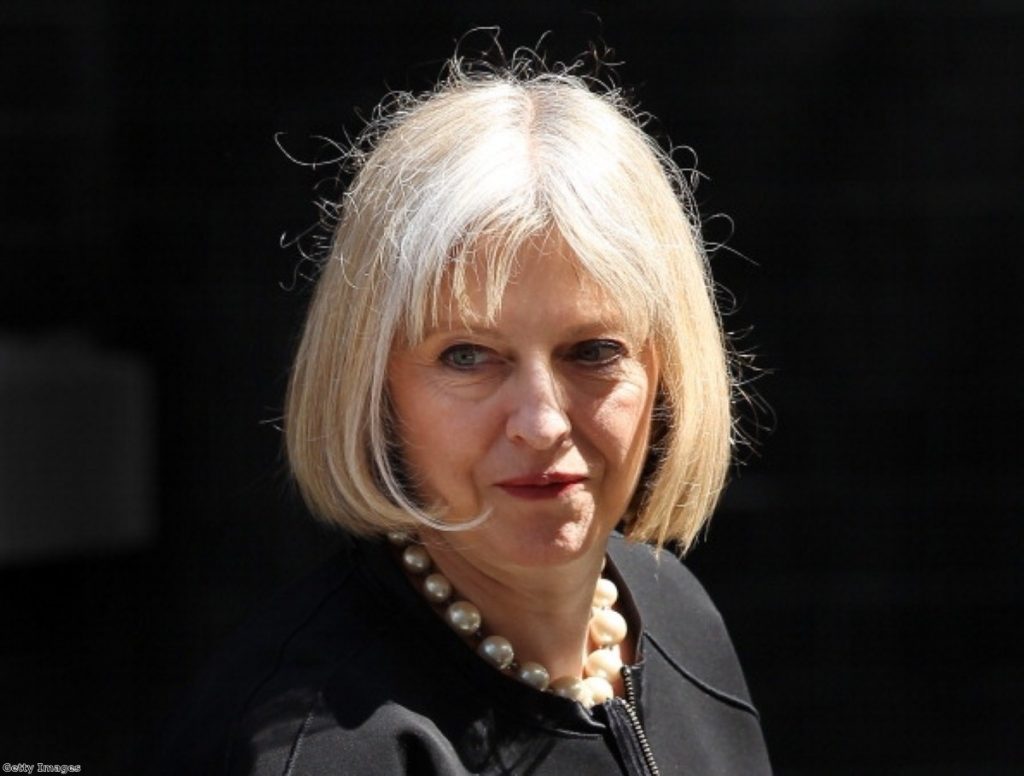Could Theresa May’s ‘extremism Asbo’ ban the Socialist Workers Party?
Updated 13:28. See below
We've only the broad outlines of Theresa May's new 'banning orders' and 'extremism disruption orders', but they are already startlingly wide-ranging.
At first glance – and we will have to wait for further information in her conference speech – they would appear to ban groups such as the Socialist Workers Party (SWP), the English Defence League or some anti-abortion groups.
The banning orders, which would apply to organisations, are aimed at groups who are not involved with or encouraging terrorism, but undertake activities "for the purpose of overthrowing democracy". That is obviously a very wide term which applies, for instance, to all revolutionary Communist or Socialist groups.


Organisations could also face a banning order if they incite religious or racial hatred. This is also a difficult category. A Christian group which wished to read certain juicier sections of the Old Testament in public would satisfy it.
Groups could also face a banning order if there is a pressing need to protect the public from a risk of violence, public disorder, harassment or other criminal acts.

This is a clear attempt to degrade British legal standards. Groups which incite violence are already banned. This would apply bans to a lower standard, where a minister believes they might create a risk violence by virtue of their activity. Say Nigel Farage makes an impassioned speech against Muslim immigration. This might create a risk of violence among impressionable viewers fired up by his rhetoric. Should Ukip be subject to the orders?
The use of the phrases "public disorder" and "harassment" are particularly concerning. It is easy to imagine the use of banning orders against harmless groups like Occupy or UK Uncut ahead of a May Day protest. Anti-abortion groups, who often camp outside of abortion clinics trying to talk to women going in for a termination, often while holding graphic images of dead foetuses, could potentially be included in the harassment category.
The standard of proof for these initiatives is very low. There'll be an immediate review by the high court, but ministers must only "reasonably believe" the group satisfies these criteria.
Extremism disruption orders – which would apply to individuals, not groups – would be issued by a high court judge on an application from the police on the lower legal test of "balance of probabilities" rather than the stronger test of "beyond reasonable doubt". This means judges won't even need to be sure before they strip British citizens of their rights of free speech.
Individuals would be banned from speaking at public events, protests or meetings, they'd have to inform the police in advance of a public event they planned to attend and could be barred from particular locations. They could not broadcast, associate with certain people, or post to social media without police authorisation.
Again, the high court would have to decide the individual was intending to spread, incite, promote or justify hatred on the basis of a person's disability, gender, race, religion, or sexual orientation "for the purpose of overthrowing democracy". But when Lord Carlile, the former independent reviewer of terrorism laws, was on the Today programme this morning, he suggested the legal standard would also include "alarm or distress".
That's a reasonable conclusion. 'Alarm and distress' are standard statutory categories added to 'harassment', for instance in Section 5 of the Public Order Act 1986. They are very broad and problematic categories and indeed have led to some quite perverse outcomes. Police often arrested people for swearing, for instance, by claiming to be personally 'distressed' by it. An Oxford student was arrested for saying a police horse was gay. The standard is slippery and problematic at the best of times. Applying it to anything as severe as extremism orders is asking for disaster.

Of course, May doesn't actually want to ban the Socialist Workers Party or anti-abortion campaigners or Christian groups. This is the usual tactic: they stretch out the legal standards to breaking point to allow the police as much leeway as possible, then hand-pick their targets. It degrades British legal standards, it discriminates against certain causes, it allows ministers far too much power over free speech and it constitutes thought crime. If someone does not believe in democracy, that is their problem. We should certainly not be so insecure as to outlaw their views.
The combination of broad offences and specific, severe legal sanction was precisely the technique used by New Labour. David Cameron attacked it in opposition and stuck to his word in the first few years of the coalition. Now sensible, moderate men like Dominic Grieves have been jettisoned and the authoritarians are running amok once more.
I'll update the blog once Theresa May has made her speech and we have a clearer idea of what’s being proposed.
Update 13:28:
There was precious little detail of the new orders in Theresa May's speech (which, for the record, was very well recieved in the hall and in the press). I've called the Tory press office and they've not got anything to add yet either, although they may be sending something later.










